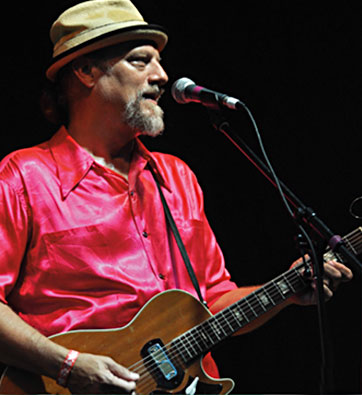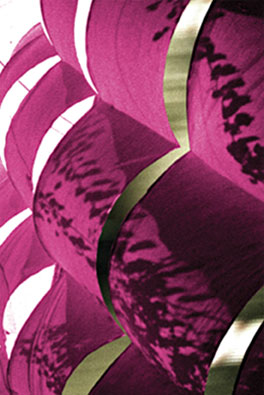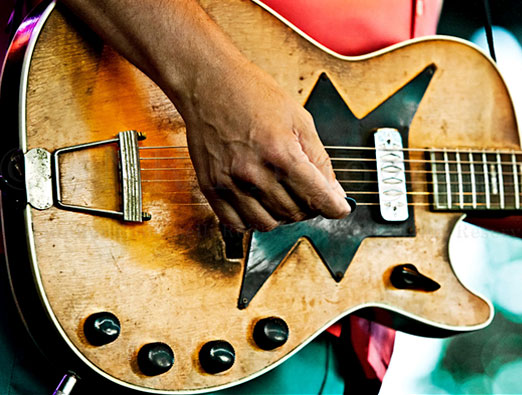


Bio
Paul Cebar, that natty-hatted, guitar-wielding, tertiary color wearing singer man with the spectator shoes has had a long, illustrious career creating music that travels back and forward across eras, while also drawing on influences from around the globe.
Known for his work in the R&B Cadets, Paul Cebar & The Milwaukeeans, and Paul Cebar Tomorrow Sound, Cebar has entertained audiences with infectious, dance-happy, genre-hopping music that has earned a loyal following from the public as well as his peers. Joe Ely has described him as “an American original,” while Bonnie Raitt proclaimed: “I’ve been a fan of Paul’s for a long time.” Nick Lowe, meanwhile, hailed him as “the real thing: a proper soulful cat with the tunes, the chops and the voice to swing this epoch back to its senses.”
Cebar followed a unique path to develop his distinctive musical style. Growing up with 60’s rock’n’soul radio in the air, Cebar fell in with a family, with an incredible R&B and blues record collection, stocked with the likes of Louis Jordan, Sister Rosetta Tharpe, Buddy Johnson, and Big Maybelle. “We would sit around and listen,” he recalls “(and) after they went to bed, I’d be sitting down in their living room, taping cassettes of all these 78s and 45s.”
Starting to play in folk clubs during high school, Cebar’s musical interests really expanded at the experimental New College of Florida, in Sarasota. Besides discovering the music of Taj Mahal and Ry Cooder and taking to dancing, he made the first of frequent trips to New Orleans, where he saw the legendary James Booker performing on solo Hammond at the nascent Tipitina’s nightclub. “It was a great, great thing,” he reveals. Epitomizing his love for the sounds of New Orleans, Cebar has attended JazzFest every year since 1981.
New Orleans also factored into another epiphany. While back home from college, Cebar attended an Arts Festival presenting Nigerian drummer Babatunde Olatunji, Art Blakey’s Jazz Messengers, and the Mardi Gras Indian dance band, the Wild Magnolias, who he followed around the grounds. “I’ve been so inspired by that one day of music” he reveals. “It sent me on a lot of quests.”
These quests have taken him to travel around the globe seeking out music. Since the mid-80s, he has hosted a weekly radio program “Way Back Home” on the Milwaukee community station WMSE on which he continues to share his fascinatingly broad musical interests with his listeners.
After college, he hooked up with a popular Milwaukee band, The R&B Cadets, who blended original rock, soul and R&B to which Cebar brought his ebullient stage antics and wealth of obscure cover material. Just as the band received its big break in 1986 – recording their debut for the influential indie label, Twin/Tone – the band’s headman, John Sieger, found his other band, Semi-Twang, signing with Warner Brothers, leading to the Cadets’ demise.
Cebar quickly pivoted to shifting his acoustic jump blues side project, Paul Cebar & the Milwaukeeans. to full dance hall strength mining a similar R&B and soul groove, spiked with world beats; The big difference was Cebar was now writing the tunes and quite the tunes they were. The long-popular dance band put out an album on Shanachie Records, 1993’s That Unhinged Thing, and several more for Milwaukee’s Don’t Records label. In the early 2000s, he shifted gears again with Paul Cebar Tomorrow Sound, a funky, rockin’ outfit with a global musical view. The band, which has released a pair of albums, has appeared on both Mountain Stage and A Prairie Home Companion (the Milwaukeeans also performed on Prairie Home). Cebar collaborated too with NPR favorite David Greenberger (Duplex Planet) on several musical projects, stating that “I did some of my best guitar playing on those records.” In the 2010s, Cebar revisited his acoustic folk roots, forming a trio with fellow Wisconsin-based singer/songwriters, Peter Mulvey and Willy Porter (aka Peter, Paul, and Willy).
Cebar’s new solo album might be his most eclectic work to date. It draws upon his interests in New Orleans and reggae rhythms while also tapping into his life-long love for soul and R&B. Additionally, there are tunes where he visits vintage garage rock. To realize this cohesive, genre-spanning set, Cebar utilized his decades-plus Tomorrow Sound colleagues (keyboardist Bob Jennings, drummer Reggie Bordeaux, and bassist Mike Fredrickson), New Orleans pals (horn men Derek Huston and Charlie Halloran), and new collaborators (trumpeter Doug Corcoran and NRBQ’s Scott Ligon). Cebar singles out high praises for multi-instrumentalist/producer/engineer Alex Hall (“I love what Alex has done”) for his invaluable contributions. Wherever he and his crew take these songs, the music on Paul Cebar comes from a deeply genuine place to create a truly captivating work.
About Paul Cebar Tomorrow Sound
Paul Cebar Tomorrow Sound are the latest in Fresh Venerable. Benefitting from years of unassuming and understated hipness, they bring forth a funky, lyrically charged racket that sits comfortably with soulful sounds the world over.
Intricate but free-swinging, explosive yet intimate, fresh and green as grass.
Taking cues from the dance bands of western Louisiana (and his native Midwest), the streets (and 45’s) of New Orleans, touring African and Caribbean combos and the soul, funk & blues of his youth coupled with early, teeth-cutting experience in the verbal hotbeds of the coffeehouse scene, Cebar is a masterful synthesist of rhythmic culture.
Tomorrow Sound are an elite crew of offhand adepts who bring plenty of their own wood to the fire. Drummer Reggie Bordeaux, casts his nets with a mystifying subtlety bringing his own fleet-footed refinement and grease. Multi-instrumentalist Bob Jennings, lends his bandleader the luxury of implying a much larger ensemble with his multi-hued contributions on keys and reeds. Bassist Mike Fredrickson (a distinguished singer-songwriter in his own right) anchors and prods with the best of them.
Paul Cebar cut his teeth musically in the coffeehouse folk scene of the mid-’70s in Milwaukee. First paying gigs took place in late ’76 with an emphasis on solo recasting of small combo jump-blues and other early R&B. Upon graduation from New College in Sarasota, Florida, with a thesis addressing rhythm & blues varieties featuring a hearty emphasis on Louis Jordan and Buddy Johnson, Cebar dedicated himself to trodding the boards in earnest and spent substantial amounts of time testing the waters out New York way while exploring band dynamics with a soul and New Orleans-minded crew called the R&B Cadets back home. The Cadets ranged about from 1980 to 1986 and featured the grand original tunes of John Sieger alongside the winning assortment of B sides and obscurities that were the fruits of Cebar’s research. Concurrently, he kept alive the spark of his solo work with a small group which came to be known as The Milwaukeeans. Throughout the early 80s, this combo featured Rip Tenor on tenor sax, Alan Anderson on upright bass, Robyn Pluer on vocals and Paul on acoustic guitar and vocals, and drew most of its repertoire from ’30s, ’40s and ’50s jazz and R&B.
With the demise of the Cadets in mid-1986, Cebar and Pluer, Tenor and Anderson welcomed drummer Randy Baugher and early Cadet saxophonist/vocalist Juli Wood to a new dance-floor fortified version of The Milwaukeeans which reflected Paul’s ongoing and deepening fascination with African, Latin American and Caribbean rhythm & blues analogues. Rambling about the Midwest for the remainder of the ’80s with occasional forays east and south, The Milwaukeeans began to rely more and more upon the original material that began to emerge in the aftermath of years of interpolation and grappling with favorites.
The first studio album, “That Unhinged Thing,” which was culled from a number of years of recording, finally saw the light of day in 1993. It sparked a wider itinerary in the touring department, with initial forays to the west coast and Canada, as well as returns to the east and south. Following the release of the record and six months of touring, founding member and estimable vocalist Robyn Pluer left the band to attend to le private life.
Rebuffing the command of the record label, Shanachie, that he add a female vocalist, Cebar and cohorts ventured forth into the storm without a label umbrella for what turned into two years of enthusiastic touring with much attendant hand-wringing. Finally, they landed on the shores of a little label that could (for a while), Don’t Records, a Milwaukee-based, heart-driven indie. In the summer of ’95, they set about making “Upstroke for the Downfolk,” while upon its release in the fall of that year began to make inroads at adult album alternative radio outlets nationwide. The single “Didn’t Leave Me No Ladder” ushered the fellows to a new level of visibility and the vans rolled on.
A six-song EP, “I Can’t Dance For You,” followed in the spring of ’96 and was superseded by “The Get-Go,” a full-length recording released in the fall of ’97. Radio support was more sporadic, though the fan corps kept growing. But halfway through ’98, Don’t’s distributor declared bankruptcy and its inventory was impounded. With its merchandise out of reach, Don’t found it increasingly difficult and ultimately impossible to carry on.
In 2001, 151/2 years into the dance band incarnation of The Milwaukeeans, the fellows presented, “Suchamuch”,a long-requested live album recorded at Martyr’s in Chicago and continued to offer their multifarious wares to all and sundry. The present day incarnation of Tomorrow Sound took shape with the arrival (8 years back) of bassist, Mike Fredrickson, joining 22-year veterans Reggie Bordeaux on drums and Bob Jennings on saxophones and keyboards.
The peripatetic pageant continues unabated with renewed focus on “the song” in the context of the increasingly forceful rhythmic exploration that is at the heart of Cebar’s quest. Stripping back to 4 pieces has opened up space for the understated command of Bob Jennings’ keyboard and saxophonic thinking. Field Marshall Cebar’s pithy guitar musing comes to the fore building upon the muscular rhythmic lattice laid by Reggie and Mike. With an ever-deepening appreciation for the funk and the polyglot rhythmic conception that is their trademark, Paul Cebar Tomorrow Sound said More! More! More! in 2004. Way to thrive in 2005! Dipped their wicks in 2006, Partied like ’11 in 2007, and have their wild heads on straight in 2008. Fine fine Fine into 2009! funked it again and again and again and again in ’10, made like 2107 in ’11, and have packed up the worry they shelved in ’12, incorporated the added vim they were flirtin’ with in ’13 and are full-on sportin’ A-team in ’18.
Presently spreading the word with their gangling, headlong and insouciant record,”FINE RUDE THING”, Paul Cebar Tomorrow Sound want and need you to come on out and help them get down.
Many musicians have graced the stage with Paul in the course of the aforementioned wander. He’d like to thank them all again for the loving spirit they brought to bear on the music. A partial list would include: Rip Tenor, Alan Anderson, Robin Pluer, Guy Hoffman, Juli Wood, Randy Baugher, Peter Roller, Tony Jarvis, Greg Tardy, Mac Perkins, Paul Scher, Michael Kashou, Michael Walls, Ethan Bender,Patrick Patterson, Romero Beverly and the present day crew, Bob Jennings, Reggie Bordeaux,and Mike Fredrickson. Viva le Musicianers!!!!!!!
